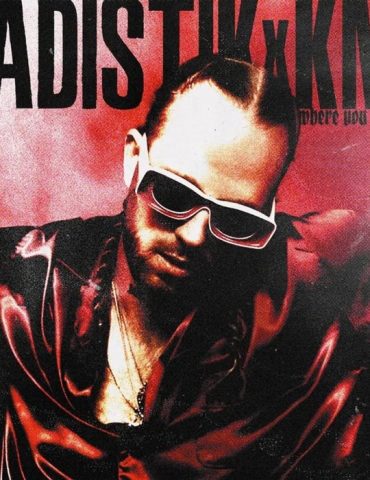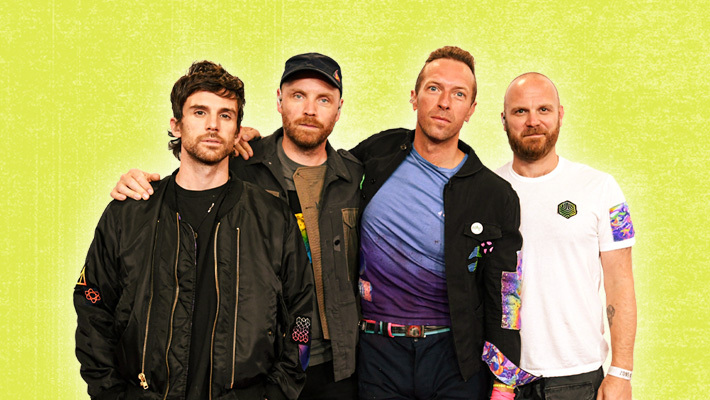-
 play_arrow
play_arrow
DisnDat HITZ DisnDat HITZ
-
 play_arrow
play_arrow
Warlando Hitz Warlando Hitz
-
 play_arrow
play_arrow
DisnDat Tunez Reggae,Dancehall and Afro Beats
-
play_arrow
Allow Us to Re-Introduce Ourselves
For anyone trying to understand the tenor of mainstream comedy in the mid-2000s, you could do a lot worse than The 40-Year-Old Virgin. Seth Rogen and Paul Rudd are the relative alpha males who are, functionally, sidekicks to Steve Carrell’s titular lead. There’s a throwaway scene that does little to move the plot along, and yet, it’s the part I most vividly remember most two decades later. Rogen and Rudd play video games and engage in one-upmanship over the following prompt: “You know how I know you’re gay?” I’ll spare you the build-up because all that matters is the killshot: “You like Coldplay.”
I didn’t like Coldplay in 2005, I loved them. Particularly X&Y, which had been released two months prior to The 40-Year-Old Virgin. However much offense I could assume on behalf of others, I could only personally take umbrage at how bizarrely inapt Coldplay was for that particular joke (the same crew was dropping Godspeed You! Black Emperor gags in Knocked Up, you’d figure they’d know better). See, in those… let’s just say, less enlightened… times, “Clocks” or “Yellow” or “Speed Of Sound” were not in any way, shape, or form being adopted as queer anthems, nor were they more likely to be playing in your local gay club than they were at, say, Kroger. Rather, Coldplay was now widely understood as the opposite of music liked by straight men. Not music made by or for homosexuals. But, you know, gay, as in “lame.” This was the kind of distinction you could play for laughs in a major motion picture in 2005 (related, this was also the height of Dipset normalizing “no homo” jokes). If this movie was made ten years later, I guarantee Mumford And Sons would’ve been the punchline.
On the most recent of the many Indiecast episodes where Steve and I discuss the state of music journalism, he stressed the most important quality a critic can have: establishing a foundation of trust with the reader. For anyone to develop a sustainable audience outside of their publication, there has to be an understanding that the writer truly believes what they are saying and that they’re not just following trends or taking a quasi-anthropological approach à la sports or politics where they see themselves as witnesses to a phenomenon rather than interpreters. I agree with Steve and try to follow that ethos, and also, sometimes it’s just a lot of fun to have a bit. And sometimes I keep at the bit so long, I can’t even remember if I actually believe the bit. Such as, “being the X&Y guy.”
In 2025, I don’t think X&Y is considered a flop or a particularly bad Coldplay album, let alone the worst, all things considered [gestures at the last ten years of Coldplay albums]. Yet, amongst the critics who would take a Coldplay album ranking list seriously, it’s frequently seen as the dud of their 2000s output, an artistic dead-end between A Rush Of Blood To The Head and the aggressive, art-rock rebrand of Viva La Vida; my understanding is that this is also Coldplay’s assessment of X&Y.
I thought about simply doing a 20th-anniversary piece on X&Y, but at some point, I probably would’ve claimed that it’s my favorite Coldplay album and, thus, the best one. Is it though? I can’t make that kind of claim without showing my work first.
10. Everyday Life (2019)
This list contains some of the most craven, creatively bankrupt music ever to be made from an artist I used to enjoy, but you won’t find it at the bottom of this list. How does that work? Well, let’s take a song from the album in the 10 slot, one where Chris Martin has big thoughts about the state of violent race relations in America, where “my sister can’t wear her crown” and “they hung my brother Brown” (I’m assuming he’s referring to Michael Brown and not using a Bono-like syntax so that “my Brown brother” rhymes with the previous line… either way, one also has to wonder if Chris Martin is playing a Black character in this song or whether he believes we’re all brothers and sisters, and I don’t know which one is more objectionable). It ends with a field recording of Philadelphia police engaging in racial profiling and thus is the only Coldplay song to my knowledge with multiple uses of profanity.
Sounds pretty grim, right? Apocalyptic even? The song is called “Trouble In Town.” Really, “Trouble In Town.” Trouble. In town. “Trouble in town” is what you use to describe, I dunno, roving gangs of 1950’s teens who stay out all night playing stoopball and racing their bikes after having one too many at the soda parlor. Or, a big box store coming in to chase out the beloved mom and pop. I get it, “town” rhymes with a lot of other words, such as “my brother Brown.” But “Trouble In Town” is just a microcosm of how Coldplay, despite being one of the biggest and most recognizable bands on the planet, had no business making a record like Everyday Life.
Positioned somewhere between Blur’s Think Tank and Rattle & Hum, Everyday Life intends itself as an earnest and respectful globetrotting excursion and also a double-album that allows for odd, risky experiments that expand the parameters of a festival rock band’s po-faced reputation; For what it’s worth, Everyday Life is still only 52 minutes long, about ten shorter than X&Y. The Arabian jazz song is called “Arabesque,” the song about guns is called “Guns,” the song about child neglect is called “Daddy,” and again, the song that touches on centuries of oppression is called “Trouble In Town.” There’s also a song called “Orphans” where Martin instructs us to imagine being Syrian refugees, wishing we could “go back and get drunk with my friends.” Well, tonight, thank God it’s them instead of you!
And yet, Everyday Life managed the highest Metacritic score for Coldplay since A Rush Of Blood To The Head — by 10 points! It’s also their poorest-selling album, but popular and well-meaning enough to earn a Grammy Album Of The Year nomination. You might think I’m being unjustly hard on Everyday Life for being the only Coldplay album of the past decade that isn’t mercenary pop music, but at least the mercenary pop albums didn’t make Coldplay sound completely out of their depth.
9. Music Of The Spheres (2021)
Even as someone who feels strongly enough about Coldplay to rank all of their albums, by 2021, I wasn’t going to listen to a new one unless someone paid me to review it. Hearing that they were linking up with Max Martin did nothing at all to entice me, as the input of someone who “essentially defined the parameters of pop music over the last quarter-century” is personally a net negative. “Higher Power” wasn’t bad exactly, at least for a “Blinding Lights” ripoff coming from a guy who has spent his entire career trying to be the exact opposite of The Weeknd; Lest we forget that Coldplay pledged to fire any member of the band that got into “hard drugs,” which naturally leads to the question of how Coldplay defines “hard drugs.”
Music Of The Spheres contains some of Coldplay’s most popular songs, and while you can’t argue with results, you can argue with the methods, i.e., drafting off the unstoppable commercial momentum of BTS, duetting with Selena Gomez, and such. Yet while Coldplay is, statistically speaking, a pop band, working with Max Martin only reiterates how Chris Martin makes for an extremely dull pop star. Not that he was any more interesting as a rock star, but without the art-rock pretensions or pathos of their first four albums as ballast, Coldplay’s pop instincts reveal themselves as pure people-pleasing. My most enduring memory of this era comes from seeing billboards for the Music Of The Spheres tour, where Martin is posed in a way that reminds me of that Kevin Gates “he don’t got a single song where he needs to be doing this” meme. Music Of The Spheres is nothing but that song.
8. Moon Music (2024)
Here are the very first lyrics on Moon Music:
“Once upon a time, I tried to get myself together
Be more like the sky and welcome every kind of weather
Be more eagle-like and find the flight in every feather
Once upon a time, but I’m still trying to get better.”
It says a lot about Music Of The Spheres that this is preferable, but I’d chalk that up to the two minutes of lunar-roving Jon Hopkins orchestration that precede this verse. Or, perhaps to Martin’s claim that Moon Music was intended as “the most Coldplay Coldplay album,” an admirable, occasionally met goal that is nonetheless not even remotely true. It is certainly more Coldplay than its predecessor, in that you can actually tell that the other members of the band were in the studio at some point and, aside from the inevitable, yet no less tortuous debut of Chris Martin’s rap voice amidst Lil Simz and Burna Boy on “We Pray,” there aren’t as many guest stars. Then again, it’s less Coldplay in that I haven’t heard the singles anywhere near as often as the ones from Music Of The Spheres. Sometimes less is more.
7. Ghost Stories (2014)
Mercury Rev opened a run of Australian shows for Coldplay, which inspired drummer Will Champion to post a note on the band’s website — “If I could go back to 1998 and tell a 20-year-old me that we would be playing some shows with Mercury Rev in 2009, I think my younger self would laugh me all the way back to the present.” The fact that Champion could feel this way in 2009, after a solid decade of incomprehensible success, goes a long way towards proving that maybe Coldplay are every bit as wide-eyed and earnest as they present themselves on wax.
Still, at that point, it was a gentle reminder that while Coldplay spent very, very little time as an indie or even alternative rock band, they were initially discussed within indie/alt spaces, having emerged from the wave of bands vying to be “the new Radiohead” (by sounding like the old Radiohead). Though maybe this would have been different had they followed through on their dreams of having Deserter’s Songs producer Dave Fridmann behind the boards on Parachutes, fifteen years later, Ghost Stories was the first Coldplay album that actually bore the influence of contemporary indie trends. Teaser “Midnight” promised a more startling artistic reinvention than anything from Viva La Vida, a bleak, beatless and chorus-free Auto-Tune odyssey stripped entirely of anything recognizable as “Coldplay.” It also sounded a lot like Blood Bank-era Bon Iver, James Blake, How To Dress Well, or anyone else hewed more towards the ambient side of “PBR&B.” There was a non-zero chance that Chris Martin was listening to stuff on Tri Angle at that time.
Is “Midnight” any good? I like it well enough, although it wasn’t really an accurate representation of anything about Ghost Stories aside from its morose emotional state, which nearly everyone attributed to Martin’s quasi-separation from Gwyneth Paltrow (the two were still living together as of 2014). Everything about this album should have played to Coldplay’s strengths, at least the strengths that they had established on Parachutes, where they were making heartsick ballads out of pure instinct. But while the nine-song tracklist, the subdued album cover, and deadpan title all signified a somber, mid-career “breakup album” a la Sea Change, “small ball” for Coldplay in 2014 entails working with producers who recently worked with Adele and Kanye West.
As such, this is no Adore or Tunnel Of Love, and not just because it ends with an Avicii collab: Ghost Stories signifies intimacy and despair without really confirming that Martin experienced any of it firsthand. Witness “Ink,” whose central metaphor implies that Chris Martin knew anything about getting tatted up (and with that said, he and Dakota Johnson did get matching infinity tattoos several years later). Or, him listlessly yearning for “your body on my body” during “Another’s Arms.” Aside from the aforementioned, Ghost Stories holds up better than I expected ten years later, mostly because Coldplay would never make an album this weird or defiant again.
6. A Head Full Of Dreams (2015)
To Pimp A Butterfly dominated every single year end list and it would have had some stiff competition in Black Messiah had D’Angelo dropped his comeback only three weeks later. So I’m certainly not under the illusion that 2015 was a year of optimism and unity. And yet, given everything that came after, I don’t begrudge anyone currently writing 10-year anniversary pieces that treats 2015 as such; Rolling Stone ranked the original Broadway cast recording of Hamilton at No. 8 in its year-end album list and I challenge anyone to find a piece of music criticism that has aged more poorly than this: “In Hamilton, the complex policy debates of the early Republic are rendered in verses worthy of Kanye. But along with being outrageously thrilling living history, it projects brilliantly into our own election season. As Hamilton and Marquis de Lafayette sing after whooping ass on the British: “Immigrants, we get the job done.” Take notice, King Donald.
Myself, the most “2015” of 2015 albums are pure Obama-core. For example, Tobias Jesso Jr.’s Goon, or Surf, the first and last album from Chance The Rapper’s weed bible holders Donnie Trumpet And The Social Experiment, or Jamie xx’s malltronica classic In Colour. Or, the year’s final major release, Coldplay’s A Head Full Of Dreams, a collection of EDM-curious pop that featured Beyoncé, Tove Lo, and Noel Gallagher and was so unshakably optimistic that it actually featured Gwyneth Paltrow on “Everglow,” even though you’d never know it without the credits. Oh yeah, and Barack Obama reciting “Amazing Grace.”
Artistically and commercially, A Head Full Of Dreams was a necessary album for Coldplay. Maybe they didn’t have the gumption to make Ghost Stories if they didn’t have this one next and “A Sky Full Of Stars” tipped their hand. Due to the ubiquity of “Adventure Of A Lifetime,” the title track, and “Hymn for The Weekend,” A Head Full Of Dreams sounded familiar, if not fresh, upon revisiting, aging relatively well based on what wasn’t on it. I assumed they made an entire album with Chainsmokers rather than just a song or two. I falsely remembered A Head Full Of Dreams as being explicitly EDM rather than something that just had a Stargate feature.
Also, it’s probably worth looking into why Jay-Z and Kanye and Drake actively hyped up their Coldplay collabs whereas Rihanna and Beyoncé couldn’t sound more bored on their features. The most obvious explanation is that “Hymn For The Weekend” clearly shouldn’t exist, as even the most diehard Coldplay fan knows that they can go somewhere else for a song about getting drunk and throwing ass. I’d classify A Head Full Of Dreams as “actually not that bad” or “you can do a lot worse,” but I still don’t know if that means it’s any good.
5. Viva La Vida Or Death And All His Friends (2008)
Being called “the most insufferable band of the decade” by The New York Times and “the band most likely to put you to sleep” by a UK-based Travelodge survey didn’t prevent Coldplay from being the biggest British rock band of the mid-2000s. But after X&Y, Coldplay tried to conjure up artistic ambitions commensurate with their commercial status — as Martin once remarked, “We can’t possibly get any bigger, let’s just get better.”
And so, as with most “do better” campaigns, they just threw money at the problem. In a more cynical mood, I hear Viva La Vida as Brian Eno’s Razorblade Suitcase, a legendary producer willing to play the mercenary just so long as their charges didn’t mind him mocking them in the press (and clearly, neither Coldplay nor Bush minded). Viva La Vida was, by a tremendous distance, the most interesting Coldplay album up until that point, gilded with cinematic interludes, medleys, “exotic” percussion, and string sections that do something other than add glaze to those acoustic strums. Just to show they meant business, Viva La Vida is one of the rare pop blockbusters that can be accurately described as “backloaded,” with “Violet Hill” and the iPod-selling title track jammed deep into Side B. This is where you’ll also find the Afro-pop spiked “Strawberry Swing,” which never quite became the millennial “In Your Eyes” it should have been until Frank Ocean covered it three years later.
As much as I believe Coldplay’s inveterate try-hard nature worked in their favor up to this point, their aspirations to be artistes only made their weaknesses all the more glaring. And by weaknesses, I mean “Chris Martin’s lyrics,” which are simply not up to the ambitions set by the sort of album that takes itself so seriously that it has an alternate title. At least until the title track, which weirdly does Viva La Vida a disservice by proving Coldplay’s ambitions to be the biggest and best rock band in the world weren’t delusional, which would have been more interesting than hitting the mark maybe 20 percent of the time.
4. Mylo Xyloto (2011)
Fun fact: Mylo Xyloto received a 7.0 from Pitchfork, which is virtually guaranteed to be the highest score any Coldplay album will ever get from the publication. This isn’t due to Mylo Xyloto being held up in higher regard amongst indie music critics than any other Coldplay album, nor is it due to the fact that I’m on the byline. From Viva La Vida going forward, they’ve always been assigned to writers who will talk about how much they loved the first two albums in the first couple of paragraphs, thus establishing why they’re in a position to be (inevitably) disappointed by the album they’re actually reviewing.
But Mylo Xyloto did arrive at a curious inflection point in Coldplay’s discography, one where Viva La Vida gave them enough momentum for a greater critical reassessment, or at least the typical “if you can’t beat ’em…” moment where it’s no longer any fun to crack wise about them anymore. But it also came before Ghost Stories, which marked the point of no return for Coldplay as a band with a functional artistic compass.
And Mylo Xyloto itself is an album that has its feet in both eras of Coldplay, one where they’re still clearly the band that made “Fix You” and “Clocks” and within the general realm of “rock,” but also a soft launch for their eventual turn into a pop brand on A Head Full Of Dreams. In other words, Brian Eno is still behind the boards, but now they’ve got Rihanna features. If it doesn’t quite reach the heights of Viva La Vida, “Every Teardrop Is A Waterfall” and “Hurts Like Heaven” come awfully damn close, and it’s an overall more satisfying work for dropping the portentous “epic” signifiers of its predecessor. Or at least, that’s how it turned out somehow; Chris Martin claimed that it was inspired by the White Rose movement and The Wire, and thank god none of the lyrics back that up.
3. Parachutes (2000)
In 2019, I interviewed Fran Healy for the 20th anniversary of Travis’ nü-Britpop blockbuster The Man Who and found him to be expectedly humble and kind. And he had a good sense of humor about being overshadowed by a band that was literally stalking Travis at the height of their success. “I remember being at gigs, turning around, and seeing Chris [Martin] at the side of the stage just watching us,” Healy told me. “In really weird places in the middle of nowhere in America, he’d be standing there, studying it! He’s very, very focused.”
If Parachutes is any indication, Martin wasn’t focused enough. Yeah, it’s within the same general universe of “wispy, vaguely folky British rock, ‘rock’ only because there are guitars involved.” But in excising the vestigial lad-rock elements Travis carried into The Man Who, Parachutes made that record sound like Reign In Blood by comparison. For better or worse, Coldplay were much more adept at stealing from Jeff Buckley (“Shiver”), Radiohead (I’ll assume their lawyers somehow never heard the blatant “Subterranean Homesick Alien” rip “High Speed”), and Nick Drake (take your pick). But those are the deep cuts, or as deep as “deep cuts” can be on an album that has sold over 13 million copies worldwide. “Yellow” and “Trouble” managed to crack American radio in ways that South, Elbow, Doves, and even Travis never came close to approaching — maybe the choruses were stronger, maybe Chris Martin was more telegenic, maybe they just had more marketing muscle. Either way, he made right with Parachutes, and despite its flaws, it’s held up as the peak of “the new Radiohead” wave, proof that the meek may not be set on inheriting the earth so much as world domination.
2. X&Y (2005)
I can see the hater’s perspective: X&Y is Coldplay’s arena rock album, with all of the smart dumb guy/dumb smart guy qualities that entails. Did they really open the album with the 2001 theme? What gave these guys the right to interpolate Kraftwerk? “Fix You”? You gotta be kidding me, this is a U2 song. It’s an hour long.
On the other hand, X&Y is Coldplay’s arena rock album, with all of the smart dumb guy/dumb smart guy qualities that entails. They opened the album with the 2001 theme! They interpolated Kraftwerk! “Fix You” is a U2 song and the best “classic U2 song” since Achtung Baby! And yeah, it’s an hour long and I’ll be happy if I never hear “Swallowed In The Sea” again, but don’t sleep on the deep cuts: The title track is the one time that Coldplay managed to sound seductive, “The Hardest Part” kinda does sound like them doing a decent Tom Petty, and “Low” kinda does sound like them doing a decent Bowie.
I’m willing to stand on the above should it come to that, but I’m also just going to be completely honest and cop to the subjectivity at play here. Whereas Parachutes and A Rush Of Blood To The Head mostly made me feel sad about not being in a relationship, X&Y is the album that most reminds me of the first time I was actually in a serious adult relationship, and thus, the soundtrack for Target trips, brunch on hungover Sunday mornings, games of EA College Football as we tried to figure out how to give each other space during the early stages of cohabitation. In between spins of Sung Tongs and Clap Your Hands Say Yeah, X&Y showed me the normie in the mirror and I actually didn’t mind the view.
But all that aside, “Square One” and “Talk” still whip and we’re never getting anything like them from Coldplay ever again.
1. A Rush Of Blood To The Head (2002)
Who doesn’t love it when a band uses the very first notes of its sophomore album to announce “we’re not who you thought we were”? Think “Planet Telex,” “Misunderstood,” “Silent Shout,” each in their own way projecting an air of serious artistry from acts who might have come off as frivolous on their successful, but lightweight, debuts. And so, “Politik,” with its blunt, 16th-note cymbal crashes and slashing guitar chords and post-9/11 paranoia promised a newly muscular, propulsive, and possibly political version of Coldplay, those softbatch balladeers who made their name on a guy crying at the beach. For the most part, that didn’t exactly hold true; The title track is the only other song to make any sort of reference to war, let alone matters outside of Chris Martin’s heart. Still, A Rush Of Blood To The Head accomplished something more challenging than a complete artistic reinvention: it’s simply a band doing the same things they did before, and doing it so emphatically that all of their previous weaknesses now look like strengths.
I didn’t hear Ride’s “Dreams Burn Down” until way after 2002 and even after realizing how “In My Place” was a direct rip-off, I appreciated it more; the boldness of it all, of course, but also how Coldplay stripped away all of distortion, spoke in plain English and still made something as lush and incomprehensible as the best shoegaze. “Daylight” is a less obvious rip on Echo & The Bunnymen’s “The Cutter,” but also a rare song that takes that band’s influence and turns it into something that can exist outside of the Cruel World set. It feels like the genesis for those sober, morning raves that started to pop up in Los Angeles a decade later.
On the completely opposite side of things, “The Scientist” invented the Patsavas-core subgenre that dominated Grey’s Anatomy for the rest of the 2000s. A Rush Of Blood To The Head turned Coldplay into monoculture, and, as such, the culture did with it as it pleased. The Massacre might have been the end of an era in hip-hop, but not for Chris Martin; 50 Cent quoted “God Put A Smile On Your Face” and by the next year, Chris Martin was doing guest vocals on Jay-Z and Kanye West tracks. Cloud Nothings desecrated “Clocks” with a noise cover, whereas Hovvdy’s respectful take on “Warning Sign” ushered in their artistic peak. As if the return of EA’s college football video game franchise in 2024 wasn’t an emotional enough experience for men of a certain age, someone set the trailer to the bridge of “Fix You” and created the most moving piece of pop culture in the 21st century.
Coldplay once bragged that they “try and steal all the good bits” from other musicians, and “from so many places that hopefully it becomes untraceable.” They didn’t exactly cover their tracks on A Rush Of Blood To The Head, but it’s still the album that established Coldplay as a band other bands can steal from.
Written by: dev
Similar posts
-
Recent Posts
- Court Cam: Woman Refuses To Pay Fine After Honking At A Cop, Then Clashes With Judge!
- Intense Shootout Erupts After Officer Confronts Stolen Car Suspects!
- Candace Owens Claims The Media Is Falsely Portraying Tyler Robinson As Suicidal, Says The FBI Is Lying About The Charlie Kirk Shooting!
- Young Thug Says He'd Feel Like 'Less Of A Man' If His Girl Got A Therapist: 'You'd Listen To Them Over Me?!'
- Texas Karen Explodes On Delivery Driver For Not Speaking English… Daughter Later Apologizes For Her Wild Rant Outside Walmart
Recent Comments
Featured post

Latest posts

Court Cam: Woman Refuses To Pay Fine After Honking At A Cop, Then Clashes With Judge!

Intense Shootout Erupts After Officer Confronts Stolen Car Suspects!

Candace Owens Claims The Media Is Falsely Portraying Tyler Robinson As Suicidal, Says The FBI Is Lying About The Charlie Kirk Shooting!

Young Thug Says He'd Feel Like 'Less Of A Man' If His Girl Got A Therapist: 'You'd Listen To Them Over Me?!'

Texas Karen Explodes On Delivery Driver For Not Speaking English… Daughter Later Apologizes For Her Wild Rant Outside Walmart
Current show

Hipster Morning
With Jack M.
For every Show page the timetable is auomatically generated from the schedule, and you can set automatic carousels of Podcasts, Articles and Charts by simply choosing a category. Curabitur id lacus felis. Sed justo mauris, auctor eget tellus nec, pellentesque varius mauris. Sed eu congue nulla, et tincidunt justo. Aliquam semper faucibus odio id varius. Suspendisse varius laoreet sodales.
closeUpcoming shows

KING TALK
11:00 am - 1:00 pm

DISNDAT VIBES
Every Afternoon With You!
1:00 pm - 3:00 pm
Frequency One
Mixed by Dj Monster
3:00 pm - 11:40 pm
Pop’n Roll
Mixed by Rebecca Lost
11:40 pm - 11:55 pm
Orlando Sessions
Presented by DISNDAT
11:55 pm - 12:00 amChart
-

Hipster Morning
With Jack M.
For every Show page the timetable is auomatically generated from the schedule, and you can set automatic carousels of Podcasts, Articles and Charts by simply choosing a category. Curabitur id lacus felis. Sed justo mauris, auctor eget tellus nec, pellentesque varius mauris. Sed eu congue nulla, et tincidunt justo. Aliquam semper faucibus odio id varius. Suspendisse varius laoreet sodales.
close Chart
-
1
play_arrowAdd It Up (feat. Luh Tyler & Scy Jimm)
Ratxhet
-
2
play_arrowPpp
Sawcegawdclutch
-

3
play_arrowFlorida Water (feat. Luh Tyler)
Danny Towers, Dj Scheme & Ski Mask The Slump God
-
Top popular
Quick links
Our radio.
COPYRIGHT All rights reserved.
Site Design by Superior Business Solutions.









